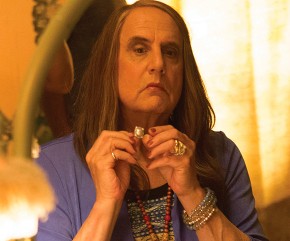Transparent need

There are two ways in American media to introduce the viewing public to a minority group: you can present a member of the group as a “normal” and “respectable” member of the middle class (think of the gay couple Mitch and Cam on Modern Family) or as someone who’s as screwed-up as any member of the human race. Transparent goes with option two.
Transparent, an original television series streaming on Amazon, follows the affluent, Jewish, Los Angeles–based Pfefferman clan as patriarch Mort transitions to being Maura (played in a mournful and tender key by Jeffrey Tambor). As Maura assumes her female identity and comes out to her children, the revelation of her secret drags a lifetime of other family secrets out into the light.
Read our latest issue or browse back issues.
Eldest daughter Sarah (Amy Landecker) throws herself into an affair with her college girlfriend, whose existence she had hidden from her husband. Josh (Jay Duplass), the middle child and only son, reveals that he began sleeping with the family babysitter when he was 15. When he falls madly in love with two different women in a short period of time, his younger sister Ali calls his behavior a “love addiction.” Meanwhile Ali (Gaby Hoffmann) experiments with sex (the act) and gender (her self-presentation) with abandon, glee, terror, and confusion.
As the punning title suggests, the real issue at stake is not “trans-parent” Maura, but transparency. Secrets are the currency of the Pfefferman family. Maura, for example, doles out money and gifts to her children, then tells them not to tell each other. Her gender secret radiates through the family and the family history, with series episodes revealing layers of self-deception and self-centeredness.
At first the viewer may think that a show about a bunch of confused and selfish Los Angelenos is not worth watching. The experience is like slowing down to gawk at a highway accident and then going home with the accident victims (or perpetrators?) for Shabbat dinner and more than a few glasses of wine. But the more time the viewer spends with these characters, the more they become full, individual human beings who are worthy of our time and attention however awkward or abominable some of their choices are.
Transparent is powerful as both the first show to focus on the topic of transgender transition and, as Emily Nussbaum wrote in the New Yorker, “the most Jewish show on television.” In fact, the “Jewishness” of the show is as surprising as the topic of transgender identity. Jewish jokes, idioms, and artifacts weave through the Pfeffermans’ lives. The most compelling—and least self-centered—character on the show is a young female rabbi who is actively engaged in ministry.
Family members both repudiate and long for religious rituals that will make sense of their lives. In a poignant and hilarious scene, the family sits down to Shabbat dinner because Sarah’s new girlfriend, Tammy (Melora Hardin), has read in Real Simple that “family rituals” provide tranquillity. Maura stumbles through her new role as matriarch, accidentally singing Passover songs.
In a later episode Ali remembers that when she was 13, her parents canceled her bat mitzvah at her request, with her dad (Mort) agreeing to respect her “inner wisdom.” Now, as an adult, she blames them for the decision.
“Who lets a 13-year-old make that kind of decision?” she rages. “Who needs Judaism? Who needs guidance? What on earth would I do with God?” Her anger and sarcasm rip open the secrecy that has shrouded the family and offers a powerful case for religious education.
Transparency, the show suggests, is not something we can achieve on our own. To see ourselves as we really are we need an external mirror. To change who we are we need support, compassion, and guidance. Religion—in this series a moral tradition as well as a way of knowing the divine—is offered as a possible source for this self-reflection and transformation. This makes Transparent one of the least cynical, most convincing shows about religion that’s offered on television.






